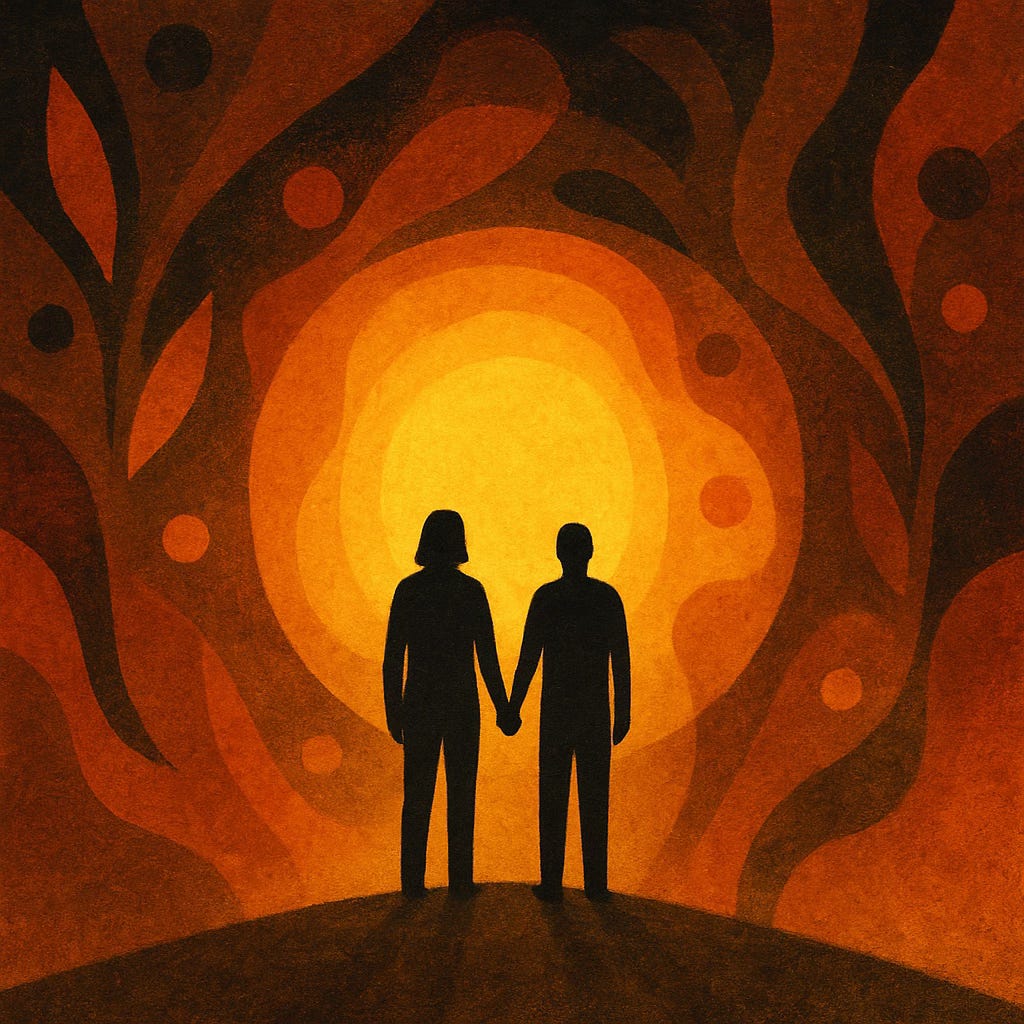Reclaiming Initiation
remembering how to belong
“We actually contain a built-in ability to rise above restriction, incapacity, or limitation and, as a result of this ability, possess a vital adaptive spirit that we have not yet fully accessed. While this ability can lead us to transcendence, paradoxically it can lead also to violence; our longing for transcendence arises from our intuitive sensing of this adaptive potential and our violence arises from our failure to develop it.”― Joseph Chilton Pearce, The Biology of Transcendence: A Blueprint of the Human Spirit
There was a time when becoming an adult meant more than turning a certain age or securing a career. It meant crossing a threshold, a deliberate passage guided by elders, witnessed by community, and held by something larger than oneself.
Traditional cultures recognized that initiation was necessary. It offered a way to metabolize the intensity of adolescence and transform raw energy into mature responsibility. Without it, we risk remaining perpetual adolescents — restless, unmoored, and longing for purpose.
The Crisis of the Uninitiated
Today, we’re living in the shadow of that absence. Modern life has all but erased authentic initiation, replacing it with hollow substitutes, such as hazing, online extremism, and endless self-optimization. Our culture prizes individual achievement over collective transformation, leaving many to seek belonging through performance or rebellion. We see the symptoms everywhere in the increasing rates of addiction, polarization, and fanaticism.
Beneath these surface expressions lies a common hunger to feel connected to something that dignifies our struggle and situates us within an evolving, communal story. As Joseph Chilton Pearce suggests, the developing brain actually requires intense, meaningful experiences to complete its maturation. When that need goes unmet, the psyche compensates by inventing thresholds through danger, transgression, or ideology. For example, the fascination with conspiracy movements, the rise of cult-like political fervor, and the allure of charismatic saviors are all distorted cries for initiation, attempts to find belonging through crisis rather than community.
An Adolescent Culture on the Verge
At the heart of our socio-political challenges in the modern world is a failure of initiation. We have only a few shared rites that mark the transition from innocence to responsibility, more specifically, from self-interest to service, perhaps only military boot camp and motherhood, which, of course, not everyone experiences. In their absence, the journey toward maturity becomes a private battle, often fought in isolation.
While capitalism, in its own way, has tried to fill the void by turning competition into a pseudo-initiation, the success and status that result replace wisdom and contribution. And as AI threatens to make vast portions of our labor obsolete, the question emerges: If work no longer defines our worth, what will initiate us then?
Perhaps we are being invited into a deeper kind of initiation, one that tests not our capacity to produce but our capacity to relate well with ourselves, one another, and the natural world we are a part of. Because proper initiation invites us to face death in some form: the death of ego, certainty, and control. It asks us to meet life as it is, not as we wish it to be. In that encounter, something larger begins to move through us; we are initiated into the field of belonging.
A New Threshold of Becoming
Ritual, when approached with sincerity, is a psychotechnology for the soul. It reorients us from isolation to participation, reminding us that transformation is not something we accomplish alone but is a threshold to be crossed together, where we are both witness and companion to one another’s becoming. Imagine if our communities were designed with this understanding in mind? What if, instead of bureaucracies that alienate, our institutions became places of initiation, spaces where people are guided through experiences that deepen responsibility, empathy, and care?
As Daniel Pinchbeck recently argues, our culture’s next evolution will depend on reuniting the scientific and the sacred, the rational and the relational. We cannot legislate belonging, but we can encourage it by first recognizing its value and then cultivating conditions in which individual people are invited to discover who they are in relationship to the community as a whole. This would require reimagining public life as an initiatory space, one that weaves together the intellectual, emotional, and spiritual dimensions of being human. Mentorship and community service could form a new kind of civic curriculum, facilitated, for instance, by wilderness and urban garden experiences.
Our private lives could be places for transformation as well. Small neighborhood groups could cultivate the art of shared reflection and mutual care — interpersonal spaces where people practice listening, vulnerability, and responsibility together. Initiation, after all, is not a single event but a way of living in consistent dialogue with transformation. It reminds us that growth is not only measured by what we accumulate, but by how fully we can participate in the unfolding of life.
The Call to Community
Whether we face ecological collapse, political fragmentation, or spiritual exhaustion, the underlying invitation is the same: to remember what it means to be part of something larger than ourselves, to re-enter the field of belonging as initiates of a living, breathing participatory universe. In the end, initiation is less about proving our strength and more about learning to serve what is sacred — life itself. And perhaps that’s what this moment in history is asking of us: to redesign our culture so that we no longer fear transformation, but recognize it as the way home.


Amen
aahhhh the old what is it to be a human thing, too busy having and doing. Electro-chemical beings capable of intermind coordination. What are we dreaming of?